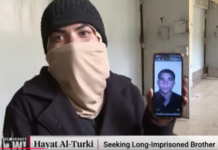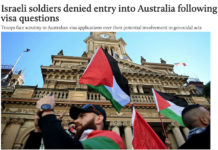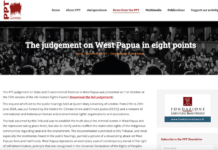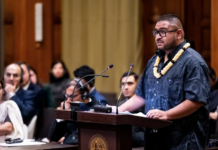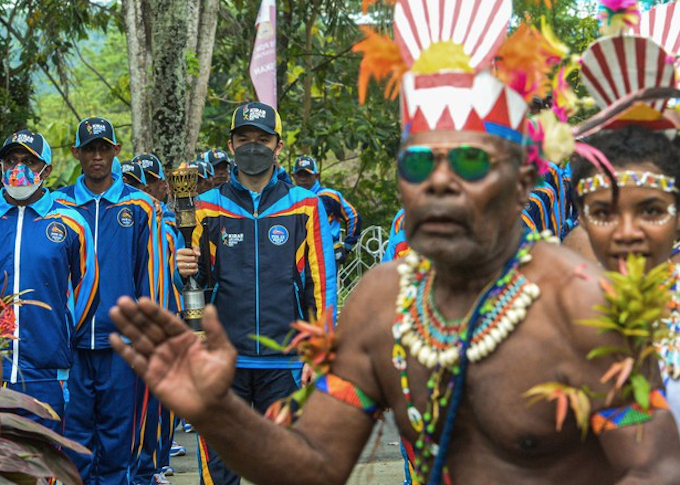
By Victor Mambor in Jayapura
A major national sports event opened in Papua at the weekend, with officials hoping it will showcase the Indonesian government’s commitment to developing the province and reassure the public that the region is safe despite an active and escalating pro-independence insurgency.
The National Games, an event held once every four years, were scheduled to take place last year but were postponed because of the covid-19 pandemic.
The games opened on Saturday and run until October 15 in Jayapura, the provincial capital, and three regencies.
Billy Mambrasar, a Papua-born adviser to President Joko “Jokowi” Widodo, said the government hoped the games would help boost the economy of the deeply impoverished region.
“The National Games in Papua, as Pak Jokowi hopes, will be successful not only in terms of sporting events and organisation, but also in creating a multiplier effect,” he told reporters.
Mambrasar said he had travelled across Papua to ensure that Papuan small businesses were involved in organising the games.
Youth and Sports Minister Zainudin Amali said the people of Papua were already benefitting economically from the games.
‘Economic impact’
“It has brought an economic impact on the communities,” Zainudin said in a statement posted on the ministry’s website.
“People sell T-shirts and souvenirs. Moreover, the situation here is under control.”
Papua won the right to host the games in 2014, outbidding Bali and Aceh provinces. A total of 7039 athletes and officials have descended on Papua for the country’s biggest sporting event, in which competitors are competing for medals in 56 sports.
The games are being held at venues in Jayapura City and three regencies – Jayapura, Merauke and Mimika. Some events, including esports, began last week.
The director of the National Counter-Terrorism Agency (BNPT) expressed optimism that the games would proceed without incident, saying the insurgency was “hundreds of kilometers away”.
“The military and police have taken necessary security precautions, so we are optimistic that all events will go well,” Boy Rafli Amar said in a video interview with detik.com.
More than 21,000 police and soldiers had been “deployed to prevent any security and public order disturbances,” national police chief General Listyo Sigit Prabowo said.
‘Safe and smooth’ hope
“What we hope is that the games will run safely and smoothly, while covid-19 remains under control,” Listyo told reporters after visiting sport venues in Papua on Thursday.
The areas where the games are being held are generally peaceful. But violence linked to the insurgency has broken out in other parts of the region that comprises Papua and West Papua provinces, and which makes up the western half of New Guinea Island.
In September, suspected rebels set fire to public buildings, including a health clinic and an elementary school in Kiwirok district, after security forces killed an insurgent during a gunfight, police said.
A 22-year-old nurse died after falling into a ravine while trying to flee the scene of the attack. One of her colleagues survived after being stabbed.
A policeman and a soldier were also killed in clashes with rebels.
The insurgency has simmered for decades in the Papua region, but violence has intensified in the past three years.
In April, the government designated pro-independence rebels as “terrorists” after insurgents ambushed and assassinated an army general who headed the regional branch of the National Intelligence Agency. The killing prompted Jokowi to order a crackdown.
Indonesian President Joko “Jokowi” Widodo, who will officially inaugurate the National Games, buys Nokens – traditional Papuan bags – from a craftswoman in Jayapura, Papua, Indonesia, Oct. 1, 2021. [Courtesy President Joko Widodo’s official Facebook account]
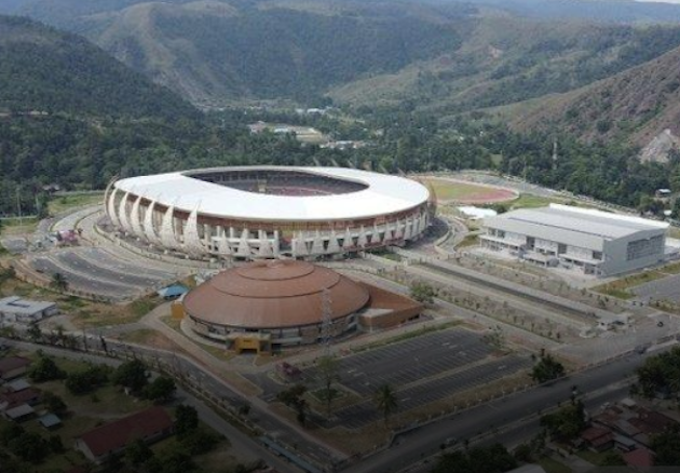
Some local businesses unhappy
Jayapura Regent Mathius Awoitauw said the games could be a once-in-a-lifetime experience.
“The National Games are a matter of pride for Papuans, because it is extraordinary to have been entrusted to host it,” he said.
But some local businesses, including members of the Chamber of Papuan Indigenous Entrepreneurs (KAPP) and the Papuan Coffee Community, said they had been left out.
“We have had several meetings with the games’ organisers but there has been no progress,” Meky Wetipo, KAPP’s executive director, told BenarNews.
“We hope that they can entrust us with providing 3 tonnes of skipjack tuna, several tonnes of carrots, and fruit. But all these things are being done by government agencies.”
Denny Yigibalom, a coffee farmer and owner of the TIYOM coffee brand, said he had met with local lawmakers to discuss cooperation between coffee farmers and the games’ organisers, but there had been no further communication.
Makers of noken, traditional Papuan bags, said they were disappointed not to have been enlisted to provide souvenirs for the games, said Cintya Warwe, the manager of the Papua Women’s Market.
Noken purchase promise
“During a meeting at the end of August with the women of the Meepago noken community, the women complained because the organisers had promised to buy 5000 nokens. But this has not happened,” Cintya told BenarNews.
She said she heard news that the games’ committee wanted to buy 25,000 fake nokens from outside Papua to be used as mementoes.
However, some indigenous small businesses are taking part in the events by setting up tents to sell handicrafts outside the new Lukas Enembe Stadium, which cost nearly $1 million to build and is named after the serving governor of Papua.
Individual residents have also been allowed to set up stalls outside the stadium and sell handicrafts and betel or areca nuts, which are traditionally consumed raw by Papuans and people in neighboring Papua New Guinea.
In Merauke, women from the Marind tribe are selling handicrafts, including bags, hats, wallets, bracelets, necklaces, and bows along the city streets.
“Sales are worth up to 3 million rupiah (U.S. $210) a day. Bags, wallets and hats are the most popular. Most of the buyers are contingents from outside Papua,” said Maria D. Keimawu, leader of a small businesses association.
Covid-19 concerns
The provincial government, meanwhile, has taken measures to prevent the spread of covid-19 during the games, including by ramping up vaccinations and limiting the number of people who can enter the main stadium to fewer than 10,000, officials said.
“Gatherings of large numbers of people, even with strict health protocols, should be cause for concern,” said Masdalina Pane, a member of the Indonesian Association of Epidemiologists.
She said cases spiked after the recently completed Tokyo Olympics and the European football championship.
Yunus Wonda, the games’ chief organiser, said more than 50 percent of people in the areas that host the games had received at least on dose of a vaccine.
“We will make sure that everyone entering the venue have been vaccinated, that’s the main requirement,” he said, referring to the opening ceremony at the Lukas Enembe Stadium.
Victor Mambor is editor of Tabloid Jubi and a contributor to Asia Pacific Report.



